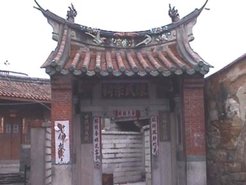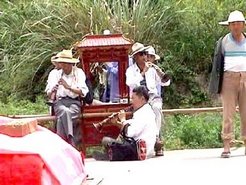Local Property Strategies and New Moral Economies in South Fujian
Project Summary

An ancestral hall
Background
I was educated at Heidelberg University and the Free University of Berlin, where I obtained my doctorate in 2000. I have always been interested in problems of social change and fascinated by China. My first fieldwork (1991-1992) brought me to Taiwan, one of the so-called "Tiger Economies" in East Asia, where I focussed on the impact of migration, wage labour and market production on gender and family relations in a small fishing village. The research for my PhD thesis (1994-1995, 1997) was based in both Taiwan and China. The thesis compared the impact of different types of state formation on the long-term development trajectory of gender and kinship on both sides, starting from a common "root" under the Late Imperial State. I argued that Chinese gender/kinship system combined two different types of relatedness, hierarchy and alliance, the first excluding women and the second centrally including them. This resulted in a "contradiction" which produced the systems inherent dynamic. To link this with the dynamics of the wider political and economic system, I used and further developed the concept of "moral economy", showing how hierarchy was tied to and reproduced in rights to "inclusive" ancestral property and alliance tied to and reproduced in lateral "gift" exchanges. I argued that processes of institutional "de-localisation" in 20th century Taiwan strengthened women's ties to their own parents and their role in producing relatedness both within and beyond the family, by decreasing the importance of ancestral property and thereby hierarchical, "male" relatedness. In the People's Republic of China, in contrast, I found that the persistence of local, territorial institutions and collective "male" property also furthered the principle of hierarchy in gender and kinship, despite socialist efforts to "bring women out of the house" and new opportunities for women to earn an independent income after the economic reforms.
My new project at the Max Planck has followed up this interest in social transformations, property relations, the production of social relatedness and moral economies I developed in my PhD thesis. Although in obvious ways different from other postsocialist states, given the communist party's continuous hold on power, Chinese experience since the late 1970s lends itself well to comparative investigations of postsocialist property systems. The encouragement of "socialist market economy" has posed a challenge to socialist ideals, particularly egalitarianism and social entitlements held by the collective. Using the concept of moral economy that I developed in my PhD, this new project investigates the increasing tension between the old collective order and the new market economy of recent decades. The area of fieldwork is Southern Fujian, familiar to me already from my previous fieldwork. This area illustrates these tensions in a specially acute form, in particular because of its "bubble economy" environment, its very intensive links to overseas Chinese communities and increasing transnational investments in rural areas. Partly as a result of "deliberate institutional ambiguity" maintained in state legislation (Ho), partly as a result of local strategies and development, property relations in South Fujian are notoriously "fuzzy" (Verdery). The project has used this "fuzziness" as a starting point, assuming that the most important characteristic of fuzzy property relations is flexibility. This flexibility leaves space for negotiations and power politics at the local level, but also for the formation of different moral communities or group identities around different notions of land rights. My first working paper at the Max Planck Institute for Social Anthropology, still largely based on my previous PhD fieldwork, discussed the moral, political and economic aspects of a revival of localised kinship groups in South Fujian in the tension between the state and the new socialist market economy.
Local Property Strategies and New Moral Economies in South Fujian
The new project has focussed on three related areas of interest.
1. Fuzzy property, changing power relations and social security. Land rights in rural South Fujian appear fuzzy in two dimensions: in the sense that land expropriation does not terminate the community's sense of ultimate collective ownership and in the sense of a local legal pluralism, where local notions of property rights co-exist in the same field as those of the state and the market. One obvious area of interest here is the intersection between these different notions of rights in the practices of different actors, and their development over time. Another would be how local property strategies affect power and socio-economic stratification in the village, as well as systems of social security in the widest sense of changing entitlements in people and "things".
2. The emergence of new social institutions. A related area of interest has been the re-emergence of temples and kinship groups as powerful new collectives. This development does not only affect local power relations, but might carve out a civil sphere where rights and obligations are renegotiated, thus a new "moral economy" emerges.
3. The new meaning of territorial communities. In contrast to what is considered typical, economic reforms in South Fujian seem to have reinforced the importance of territorial communities as distributors of resources and of "place" as a production site of collective identities. This seems to be both rooted in the pre-socialist and socialist past as well as in the contemporary erosion of collective entitlements, under a nominally socialist state that continues to define citizen rights through territorial affiliation. In Stephan Feuchtwang's words, villages have multiple identities as administrative, collective and traditional places, and they thus can draw on different types of resources inherent in each. This is also an important strategic advantage in an increasingly competitive and changing environment.

A funeral band.
My two new fieldsites, where research for the new project is being conducted, allow insights into these transformations from different and complementary angles. The recent history of Aoguan Village has been shaped by massive land expropriation for the building of a golf course. As a result, six of the twelve former production teams in the village lost all access to farmlands and 44 households had to be resettled. Nine years later, conflicts over the circumstances of this expropriation were still virulent. These conflicts centred, on the one hand, on the actions of the local state, especially with regard to the use of the compensation money, which aroused fears among villagers that they would eventually be left both without financial security and without access to land. One the other hand, they centred on the denial of collective entitlements on part of the owner of the golf course, who provided the villagers neither with adequate jobs in exchange for their land nor, as they said, kept his promise to build a road that linked the resettled households to the motorway passing the village. In interviews, villagers expressed a strong notion of remaining collective entitlements to "their land", even after it "formally" had been sold. In this situation, the re-built local temple emerged as a third "territorial" force, representing another form of collectivity and moral community "in place" and representing and asserting the collective entitlements of villagers against infringements on them by both the state and transnational investors.
The second village, Nanjiang, is an overseas Chinese home community in a region where overseas remittances have already played an important role in local development in the pre-socialist period. After the economic reforms, ties with the overseas community have been resumed and much of the village infrastructure is again financed from overseas. The overseas Chinese claim to both community membership and leadership is asserted in numerous stone stellae that commemorate their generous deeds, as well as in the huge mansions they have built in the village, which remain empty for most of the year. Overseas relatives have also largely financed the rebuilding of ancestral halls, which today control large funds. The local state's selling of land to outsiders of the "socialist collective", which has undermined a socialist "moral economy" rooted in rights to collective land, has also here been met by a revival of the "traditional" collective and place. This has involved both the transformation of private household property into collective "ancestral" property via donations, as well as cases where socialist collective property was (re)transformed into collective lineage property. Though villagers use the same terms (jitide, gongjiade) for socialist collective property and lineage collective property, the second differs from the first, in their opinion, that it cannot be privatised. The new/old collective and its property also stands in an entirely different relationship to the state (see my second working paper at the MPI).

